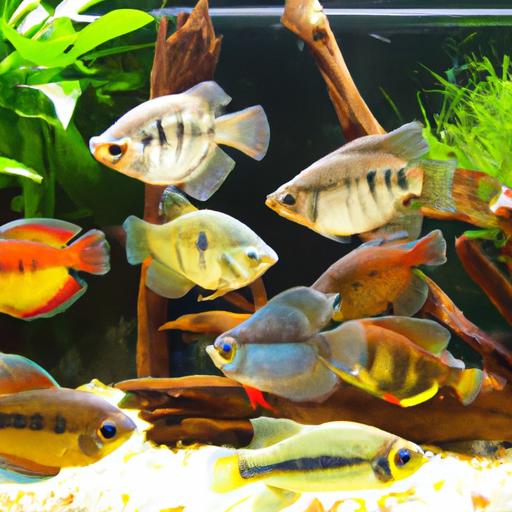
The World of Discus Fish: Care Essentials
Discover the captivating world of discus fish care essentials. Learn how to create the perfect tank setup and maintain optimal water quality.
Introduction
Are you a passionate aquarium hobbyist looking to add a touch of elegance to your tank? Look no further than the captivating world of discus fish. Known for their vibrant colors and graceful swimming patterns, discus fish have become a sought-after species among aquatic enthusiasts. However, to ensure the well-being of these magnificent creatures, it is essential to understand the care essentials required to create a suitable environment for them.
Care Essentials for Discus Fish
Creating the Ideal Tank Setup
To provide a comfortable habitat for your discus fish, it is crucial to set up the perfect tank. Ideally, a larger tank is recommended, as discus fish prefer ample space to swim freely. A tank size of at least 50 gallons is suitable for a small group of discus fish. Additionally, proper filtration is essential to maintain pristine water quality. Consider investing in a high-quality filter that can handle the waste produced by these active swimmers.
Maintaining the right temperature is another crucial aspect of the tank setup. Discus fish thrive in warmer water, typically around 82-86°F (28-30°C). Installing an adjustable heater will help you maintain a consistent temperature, ensuring the well-being of your discus fish.
Water Quality: The Key to Happy Discus Fish
Maintaining excellent water quality is of utmost importance when it comes to caring for discus fish. These sensitive creatures require pristine water conditions to thrive. Regular water testing is essential to monitor the parameters that affect the health of your discus fish.
Maintaining a pH level between 6.0 and 7.0 is recommended for discus fish. Additionally, they prefer soft water with a hardness level of around 3-6 dGH. Investing in a reliable water testing kit will help you keep these parameters in check and make necessary adjustments when required.
Performing regular water changes is crucial to remove accumulated waste and toxins. Aim for a 20-30% water change every week to ensure optimal water quality for your discus fish.
A Balanced Diet for Discus Fish
A nutritious and well-balanced diet is essential to support the health and vibrant colors of discus fish. In the wild, discus fish feed on a varied diet of small invertebrates, worms, and plant matter. To replicate their natural feeding habits, it is recommended to provide a combination of high-quality flakes, pellets, and frozen foods.
Supplementing their diet with live or frozen foods such as bloodworms, brine shrimp, and daphnia can provide additional nutrients and help enhance their coloration. Remember to feed them small portions multiple times a day to prevent overfeeding and maintain water quality.
Regular Maintenance: A Must for Discus Fish Care
Maintaining a regular maintenance routine is vital for the overall well-being of your discus fish. Besides performing weekly water changes, it is essential to keep an eye on the tank’s cleanliness. Regularly remove uneaten food, debris, and any decaying plant matter to maintain optimal water quality.
Monitoring the behavior and appearance of your discus fish is also crucial. Look out for any signs of illness, such as loss of appetite, abnormal swimming patterns, or visible signs of distress. Acting promptly in case of any health issues can prevent further complications and ensure the longevity of your discus fish.
FAQ (Frequently Asked Questions)
How often should I feed my discus fish?
Discus fish should be fed small portions multiple times a day to ensure they receive the necessary nutrition without compromising water quality. Aim for around 3-4 feedings per day, adjusting the amount of food based on their appetite and the time it takes for them to consume it.
Can discus fish be kept with other fish species?
While discus fish can be kept with other fish species, it is essential to choose compatible tankmates. Avoid aggressive and fin-nipping species that may stress or harm the discus fish. Opt for peaceful species that can tolerate the warm water conditions preferred by discus fish.
What are some common diseases that affect discus fish and how can they be prevented/treated?
Discus fish are susceptible to various diseases, including bacterial and parasitic infections. Maintaining optimal water quality, providing a balanced diet, and minimizing stress can help prevent diseases. Quarantining new fish before introducing them to the main tank can also reduce the risk of introducing diseases. If your discus fish show signs of illness, consult a knowledgeable aquatic veterinarian for proper diagnosis and treatment.
How can I introduce new discus fish to my existing tank?
When introducing new discus fish to an existing tank, it is vital to quarantine them first to prevent the spread of diseases. After quarantine, gradually acclimate the new fish to the tank’s water parameters by floating their bag in the tank and slowly adding small amounts of tank water to the bag over time. This process helps reduce stress and gives the new fish time to adjust.
Are discus fish suitable for beginners?
Discus fish are considered more challenging to care for compared to some other species. Due to their specific requirements for water quality and diet, they may not be the best choice for beginners. However, with proper research, dedication, and commitment, beginners can successfully care for discus fish.
Conclusion
In conclusion, delving into the mesmerizing world of discus fish requires a solid understanding of their care essentials. Creating an ideal tank setup, maintaining excellent water quality, providing a balanced diet, and performing regular maintenance are crucial to ensuring the well-being and vibrancy of your discus fish. Remember, these captivating creatures deserve the utmost care and attention. So dive in, explore, and provide your discus fish with the love and care they truly deserve.
Learn more about the beauty of pearl danio fish and their care essentials




























